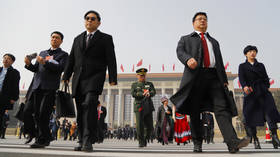China’s information blackout is a logical response to Western attempts to undermine it

Recently, an article appeared in the Wall Street Journal bemoaning the announcement of new restrictions in China on foreign access to official information and databases.
Denouncing the new rules as a “black box around information,” the WSJ leans on the notion that this is bad for business, which is often the conclusion Western media outlets make these days when criticizing anything from Beijing.
The article doesn’t elaborate on why China made the move, simply citing national security reasons given by officials. The piece spends most of its time describing Beijing as becoming more authoritarian under Xi Jinping, depicting it as paranoid and secretive while downplaying the reality that the US, in many instances backed by Western media, is actively striving to undermine China.
This is hardly a secret. Articles like the recent Foreign Affairs piece titled ‘How to Spy on China’ are only the tip of the iceberg. In pursuing geopolitical competition with China, it is obvious that the CIA, their think tank fronts and other agencies want to obtain as much information as possible about the country in order to formulate US strategy. Where do you think the designations of sanctions on Chinese companies and technologies come from? Who directs the bids to target everything China is doing, or to formulate as much negative coverage about the country as possible?
Beijing’s natural response to this kind of behavior is to simply become more opaque and more distrusting of the Western world, which has shown nothing but bad-faith intentions towards China in recent years. While the mainstream media narrative will attempt to frame these developments as ailments of Xi Jinping’s ‘authoritarian’ rule, it is simply China responding to the reality of the circumstances. The US represents an existential threat to the security, development, and wellbeing of the country, and is therefore forcing it to become more secretive. Secrecy, be it personal or political, is inseparable from the notion of security, and is hardly exclusive to communism.
Of course, this is all ironic coming from the US, a country which has itself whipped up existential-threat paranoia pertaining to all things China, to the point of accusing things such as TikTok, port cargo cranes, and even fridges of being potential tools of espionage, or pursuing a McCarthyist witch hunt campaign against scholars and academics. Similarly, those who are deemed to leak US secrets into the public domain, be it Julian Assange, or a 21-year-old US Air Force serviceman, are subject to heavy and ruthless criminal penalties, while simultaneously, anyone from China who may do the same with Chinese secrets is heralded as a hero supporting democracy and transparency.
Despite this, it is clear that China’s strategies are working, and the US does not have the insight it would like about its leadership or intentions. Although the country is so vast with a huge population, the CIA has struggled to infiltrate the PRC. As NBC quotes, “The US has yet to fully recover from a catastrophic setback in which a network of intelligence informants inside China was unmasked and dismantled” with up to 20 informants being executed. China has made it increasingly tougher for the agency to penetrate, as one anonymous US intelligence officer also told NBC: “It’s a much more centralized, tight system now.”
While of course this has a chilling effect on human-to-human ties, this is nonetheless the reality of the world the US has created. The end of China’s ‘openness’ is a structural product of recent geopolitical shifts, that is, the turn from the West embracing and encouraging China, to singling it out as a rival to be suppressed and contained. Why should Beijing, for example, share information about its economy if its documents and statistics are being twisted by so-called scholars and the Western media to push allegations such as genocide, or to manufacture consent for certain sanctions on Chinese products? None of this is happening in a vacuum.
Many people have complained that secrecy makes it increasingly difficult for journalists to “understand China,” as reported in a VOA article. But the irony of this is, are you really trying to understand China if you are a Western journalist and your primary duty is to peddle a negative narrative against it with the goal of promoting US political goals? Biased and ideologically driven reporting is hardly a healthy basis for mutual understanding. It is for this precise reason that certain Western journalists who reported from China are no longer welcome, especially those from countries like Australia, or the BBC’s John Sudworth. As opposed to ‘understanding’, they simply cannot report on the country in good faith at all, yet they play the victim and moan when the privileges they once had are being revoked.
China ultimately sees the solution to its problems as ‘removing access’, be it on the diplomatic level or the media and information level, leveraging access to those who only have ethical intentions. The US ambassador to China, Nicholas Burns, recently said, “we are ready to talk,” citing the breakdown in official communication between the two countries, but Beijing has some very good reasons to ignore him, and to keep the US hanging. Access must be earned, and either way, those undermining the country ought not to get it.
The statements, views and opinions expressed in this column are solely those of the author and do not necessarily represent those of RT.














